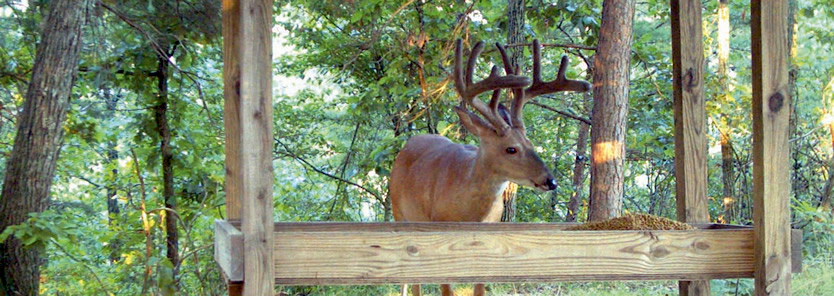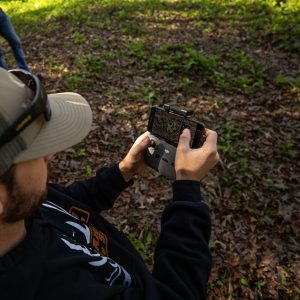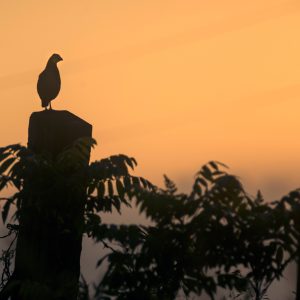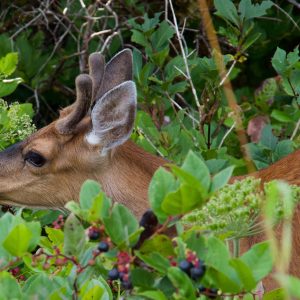It may not happen to everyone, but I believe sometime in a whitetail manger’s tenure, the satisfaction and enjoyment of growing bigger and healthier deer surpasses that of the actual hunt. I’m pretty sure I’ve reached that point. I guess now I’m as much a “Game Keeper” as I am a hunter. Make no mistake, I love to whack does with a bow and I still hold a deep passion for trying to find an old mature whitetail buck making a wrong move, but I’m truly obsessed with growing deer…big ones. For 10 years I have been managing a special piece of property. For the past four years it has been known as “The BioLogic Proving Grounds.” It lies only a few minutes from the Tennessee River and consists of 1,500 acres of mixed hardwood timber and pines in the steep hills of Northwest Alabama.
After years of very selective buck harvest, supplemental feeding, and an intense food plot program, I have grown a true “southern giant.” While we have been growing and killing above average deer for a long time (for the area), this particular buck was a “man among men.”
To say that the “dirt” that this buck grew up on is a little rough and rocky is a vast understatement. The majority of the food plots on the Proving Grounds are primarily wide places on the top of steep ridges that I cleared with a dozer and some were once logging decks from the 1980’s. Most of these fields have very shallow topsoil, (or no topsoil at all in some cases) and some are almost pure “chert” gravel and sand. Growing good crops on this ground is very challenging. However, we have proven that you can actually produce excellent groceries for your herd if you don’t mind some hard work, and you have patience and plenty of lime and fertilizer. Looking back over old soil samples and records, I’ve spread somewhere in the neighborhood of 350-400 tons of lime on these fields during the past decade.
The first trail camera picture of this deer was as a two year old…he was nothing special, he just caught my eye. He had a little better than average G-1s for a young deer but overall just an average symmetrical eight point frame. Of the thousands of photos I go through every year, he was just unique enough to make me save a couple of him.
The best images I captured of him were at a protein feeder right off the edge of a heavily manicured Clover Plus field. This plot was on its 5th year after planting and was still producing some great tonnage and it looked like he visited it frequently. I ended up getting a couple more pictures of him that fall hanging out with what looked to be a couple of three year old bucks.
The following spring most all of the available acreage on the Proving Grounds was put into BioMass and LabLab. I sprayed and mowed the perennial fields as usual. Rain was a little below average that summer and the Alabama heat was oppressive as usual, but getting the summer annuals in early to take advantage of the spring rains proved to be a good choice. Most all of the fields held on well and produced some great forage. A ReconyX camera that I had set up at the same feeder mentioned earlier starting capturing photos of a number of bucks using the field and feeder… one buck looked very familiar. He was a beautiful, symmetrical 8 point with good tine length and mass. After looking the deer over closely, I was positive this was one of the bucks I had saved pictures of the year before and he was showing some great potential.
During the fall and winter of 2008 I got pictures of him in quite a few different places on the farm. As with all our three year-olds, I told everyone he was definitely on the “do not shoot” list.
In late February of 2009 I was doing some predator trapping and took a ride to the big Clover Plus field. I couldn’t believe it! I found his sheds laying one on top of the other right beside a utilization cage in the plot. Can you say lucky? Going back and looking at his photos, I gave him credit for a conservative 15 inch spread combined with the sheds he grossed 127 inches. I was really excited he made it through the season and I couldn’t wait to see him next year.
During the late summer of 2009 the buck showed up at the same feeder and also in a BioMass all Legume plot two ridges to the south – there was no mistaking him. As expected, this buck really put on some serious growth from a three to a four year-old. After looking at all the pictures I was pretty sure he would be in the 150” to 155” class pretty easily. As a 4 year old his body was really filling out and his rack was now a mainframe 10 point with great tine length and mass, and those same unique brow tines that caught my eye as a 2 year old. His right side even had a good bump started where a G-5 would come to be. I was so pumped to see the growth of this deer and I knew he would be a trophy for any bow hunter that year.
The big clover field he seemed to be so fond of the previous years was showing some bare spots here and there from a very hot and dry summer so I decided to rotate an annual in there for a while. I felt like with all the nitrogen in the ground from years in clover it should grow some very good brassicas. I gambled on the weather and planted the 4 acre field the last week of August in Maximum and then prayed for moisture. I was fortunate to catch some timely rains and the brassicas were up and going. At planting time I had lightly disked in a custom blend of 34-28-28 at about 250 lbs per acre. By the time this field caught its third rain I think you could “hear it growing.”
The 2009 season was in full swing but no one had seen any sign of the” big ten.” By late November the Maximum field was shin to knee deep in lush, leafy brassicas and from the looks of it was really getting pounded. I decided to put a camera on a couple of scrapes on the back side of the field and right around thanksgiving had a buck walk by and trigger the camera. It wasn’t him, but far in the background I was pretty sure I could see the rack of the big ten.
As of mid December that year, only one person had seen the buck.He was running and had chased a doe right past a stand-site just down the ridge from the big plot. The hunter never had time to pull his bow back before he was out of sight. With the 2009 season starting to wind down, we made the decision that if anyone saw him to let him walk.
I know what you are thinking, “let a 4 yr old 150 class buck walk in Alabama, you must be crazy.” In early January two guys did just that, passed up an incredible buck because they shared the passion I have for growing big deer and we all said “if he survives the winter, just think what he might be next year”. After all, dead deer don’t grow. I just had the feeling that if this buck could make it to five he could really be a giant.
With the season over, I raced to get my feeders filled up and cameras hung to see who all survived. During February and even on into March I got ReconyX photos of the buck using a feeder on the far south side of the farm and knew he had made it. I’ve never looked for a set of sheds as hard as I did his. I walked every hill, hollow, and thicket on the property trying to find them. I found quite a few others in the process… just not his.
Finally in August of 2010, I found one of his sheds while hanging a camera on an old skid trail on the side of a steep ridge. It was about 60 yards off of the old roadbed and I knew before I got to it that it belonged to him. I stood there and admired it and then quickly went into marking off the side of that ridge in a grid pattern to see if the right side was anywhere close. Before I got finished marking it off, I found the other side, not 200yds from the first. I had never treasured a set of sheds like his, giving him 18 inches for spread, they grossed 153”. During that same month I started getting pictures of him at his favorite old feeder and I was amazed. Every tine had put on a couple of inches and he was now a mainframe 6×5 with some slight palmation on the end of his right main beam and a split G-5. Now 5 years old, this buck was what I had worked so long for. I hated to even guess, but I really felt like he would score in the high 160’s, but at 5 years old I wasn’t sure he was even “killable.”
The first 6 or 7 weeks of bow season the buck seemed non-existent with no sightings or pictures of him. Then in late November I got two pictures of him out in the middle of his favorite big plot. A few days later he slipped up and was killed by a very happy and proud BioLogic customer. I was there to help him drag it out of the woods. When we got to him we just sat in the woods for a while and admired this bruiser. He had dried velvet hanging off his rack in several places and so much character.
After an exhausting drag out of the woods, I couldn’t wait to put a tape on him. I’ve always been of the mind that any “mature buck” is a “trophy” and antler score is not everything, but I really wanted to know how much this guy had grown. After measuring him 4 or 5 times to be sure I didn’t make a mistake, I grossed him at 174 & 5/8”. That’s a big deer anywhere, but especially for Alabama.
On a daily basis I answer phone calls and emails from guys and advise them on growing crops to better their deer herd and hunting opportunities, but to see our products work first-hand and be a small part of the process of growing this unbelievable buck was priceless! It’s obvious that this deer had it all. BioMass, Bio-Rocks, Clover Plus and nutritious fall plots – I tried to give him everything needed to grow. This buck was a true testament – if you give them age and have some patience, with hard work and plenty of the right “groceries” you can grow some big deer on rough and seemingly unfit ground.








